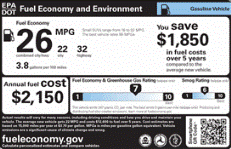Federal Tax Credit Up To $4000!

Qualifying alternative fuel vehicles (AFVs) purchased or placed into service between January 1, 2005 and December 31, 2010 may be eligible for a federal income tax credit of up to $4,000.
Vehicles purchased after December 31, 2010 are not eligible for this credit.
| Vehicle Make & Model | Fuel | Credit Amount |
|---|---|---|
| Honda | ||
| CNG | $4,000 | |
Sources:
American Honda Motor Company, Inc. - Qualified Alternative Fuel Motor Vehicles (IRS, Oct. 5, 2010)
Honda Vehicles Certified to Operate on Compressed Natural Gas (IRS, July 11, 2006)
Honda Compressed Natural Gas Vehicle Certified for Tax Credit (IRS, Nov. 22, 2006)
Alternative Fuels
more...To be eligible for this tax credit, the vehicle must only be capable of operating on any of the following alternative fuels:
- Compressed natural gas (CNG)
- Liquefied natural gas (LNG)
- Liquefied petroleum gas (LPG)
- Hydrogen
- Any liquid at least 85% methanol by volume
Additional Requirements
more...The vehicle must also meet these requirements:
- It's original use commences with the taxpayer.
- It is acquired for use or lease by the taxpayer, and not for resale. (The credit is only available to the original purchaser of a new, qualifying vehicle. If a qualifying vehicle is leased to a consumer, the leasing company may claim the credit.)
- It is used mostly in the United States.
Note: Prior to 2009, the Alternative Motor Vehicle Credit could not be used to offset the alternative minimum tax (AMT). However, beginning in 2009, the credit can be applied against the AMT.
Claiming the Credit
more...Fill out Form 8910, Alternative Motor Vehicle Credit.

For AFVs acquired for personal use, report the credit from Form 8910 on the appropriate line of your Form 1040, U.S. Individual Income Tax Return.
Other Tax Incentives
more...Some state and local governments also provide incentives for AFVs. Check with your state or local government or view the U.S. Department of Energy's list of State & Federal Incentives & Laws.
AFVs are not eligibe for electric vehicle tax credits.
DISCLAIMER
The information on this page should not be viewed as an official or legally binding document. Other requirements or exceptions may apply. For more detailed information, please consult an IRS tax representative and/or official IRS publications.










